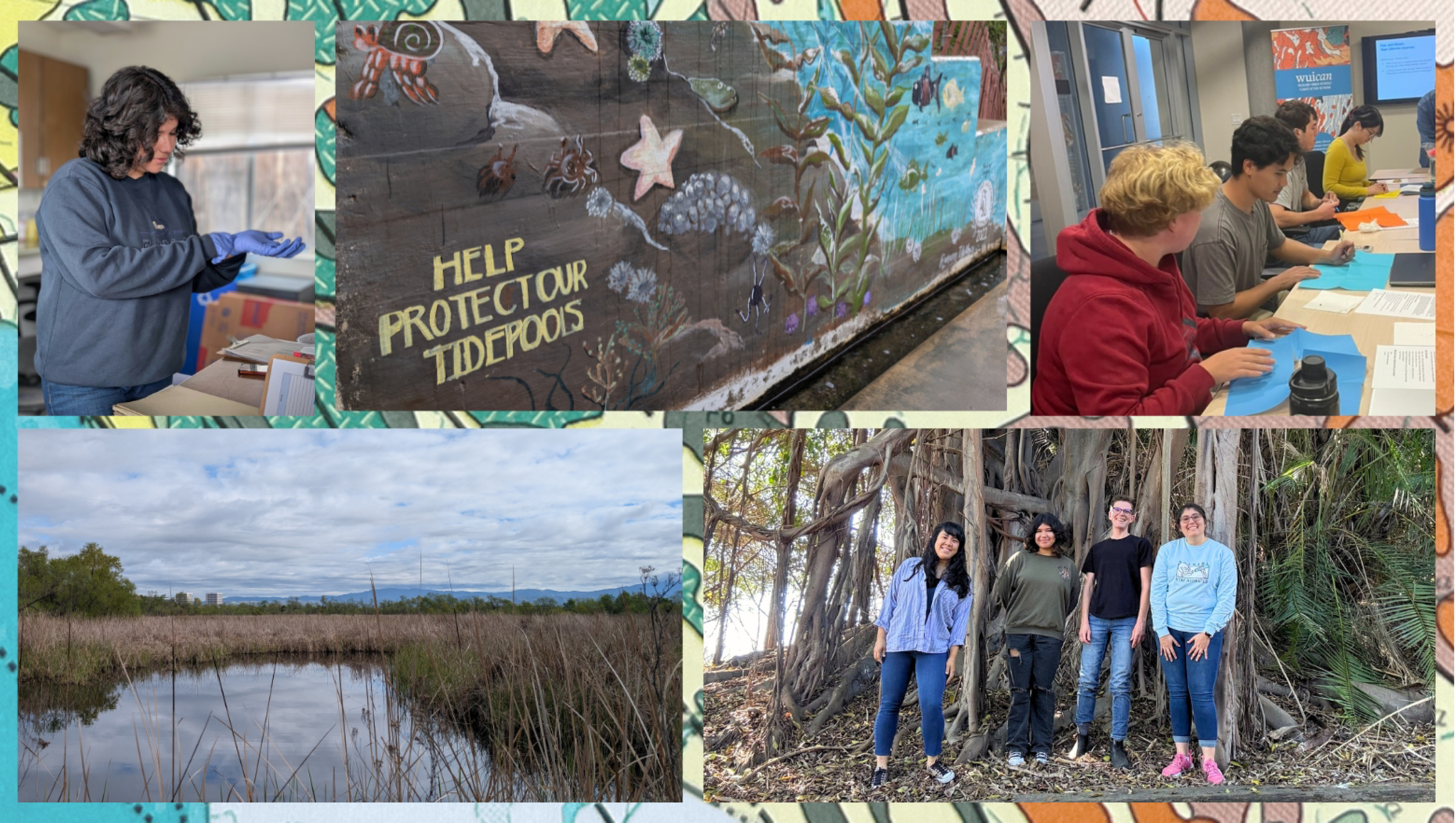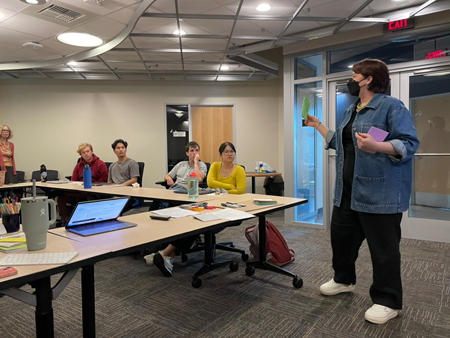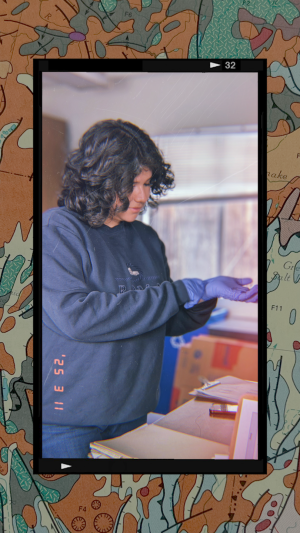
By Jake Szabo
The problem of climate change has often been addressed through approaches that are scientific, economic and political. But at UC Irvine, humanities students are addressing climate change with creative thinking that inspires action and communicates with diverse audiences – all while broadening their future employment horizons.
The WUICAN Climate Communications Internship is a unique UC program where humanities students engage with community partners to contribute to climate justice and action. This transformative internship was organized by the University of California Humanities Research Institute (UCHRI) to serve the Wildland-Urban Interface Climate Action Network (WUICAN), a climate grant connecting community partners and three universities (UC Irvine, UC San Diego and UC Riverside). The majority of the interns are UC Irvine humanities undergraduates, and the program integrates many training opportunities that draw upon the expertise of humanities staff at UC Irvine.
The School of Humanities and UCHRI have collaborated on the communications efforts of WUICAN while connecting SOH interns to various community and university partners. Interns are encouraged to use their humanities resources and experience to help organizations engaged in climate action communicate effectively.
Exploring new ways to communicate about climate
Twelve passionate interns joined the program in fall 2024. Based on their skills and interests, they affiliated with organizations ranging from land conservancies to environmental justice organizations to Tribal groups.
In the two+ quarters of the program, humanities interns have completed a diverse portfolio of work, including interviewing climate scientists, writing blog posts and designing an interpretive board of different species to showcase local wildlife at a Tribal reserve. The internship has enabled students to witness the everyday, on-the-ground action of organizations fighting for climate action, while also gaining experience that will help them find professional work once they complete their degrees.
In addition to interning for up to 10 hours a week with partners, students attended a weekly class where they shared experiences from their internship and engaged in activities focused on climate change communication. "It's been such a great collaborative learning environment," says Dr. Matthew Hartman, a postdoc at UCHRI who led the class and supervised the internship program. "Since the real work was being done by students with their WUICAN partners, the class provided space to share knowledge and learn different communications approaches to climate storytelling."

The class also helped students expand their perception of the creative media that are available to communicate about climate change. In one class session, Dr. Marianna Davison, a WUICAN postdoc, led a workshop where students created zines – small, handmade magazines – to reflect on and communicate their experiences with climate change through a grassroots medium. In another, Dr. Kelly Anne Brown, SOH Communications Director and WUICAN co-investigator, facilitated a session that challenged students to create social media posts for the School of Humanities in which they highlight issues of climate change.
Hands-on community collaboration
English major Jasmine Delgado partnered with the Research Justice Shop (RJS) and Sacred Places Institute for Indigenous Peoples (SPI), a nonprofit focused on building the “capacity of Native Nations and Indigenous Peoples to protect sacred lands, waters and cultures.” Delgado’s work included archiving historical documents from the San Joaquin Marsh that contained environmental information belonging to Indigenous groups.
Her efforts will make the marsh more accessible through the documentation she recovered, helping SPI form a curriculum inspired by Indigenous accessibility policy. For her, the internship produced a “desire to advocate for environmental spaces that are not maintained properly, and to restore relationships between Indigenous communities and these spaces.”

The internship also helped Delgado become more aware of career paths in the digital humanities. She added that archival work and biweekly meetings with SPI “taught me how to professionally pitch, present ideas and network by developing professional relationships.” She is currently working to publish the first SPI newsletter, broadening the organization's outreach.
The internship was mutually productive for Delgado and SPI. Gabriella Lassos, the Research and Policy Program Director of SPI, notes that efforts like Delgado’s archival work advance their goal of educating communities on “how to properly approach Indigenous folks in the space of doing research or as a form of respecting Indigenous lands and cultures.”
Mariel Cawthon is an English major who partnered with GREEN-MPNA (Getting Residents Engaged in Empowering Neighborhoods-Madison Park Neighborhood Association), an organization focused on community empowerment through health equity, STEM and environmental initiatives. “I've definitely developed my video editing skills and gotten more comfortable interviewing people,” said Cawthon.
During her internship, she produced a video highlighting a symbolic cultural mural created by GREEN-MPNA. The mural painting event brought the community together through the creation and experience of art. Cawthon says the internship “made me more aware of my ability to connect with others through interviews and how fulfilling community work is to me.”
What can you do with a humanities degree?
For many interns, working with climate issues in WUICAN has reinforced values – like justice, collaboration and accountability – that they learn about and experience in their humanities classes. Cawthon’s internship experience revealed to her how climate change does not affect every community equally. She expresses that “the humanities allow for a more empathic and realistic point of view when addressing climate change.”
Sara Tiersma, a literary journalism major who worked with UCHRI, experienced the unifying value of the humanities in the climate space. “Whether it be through literature, journalism or whatever other humanities study, they all center around storytelling, and this is a story that we most certainly should be telling,” she affirms.
The program also revealed possible new career pathways to students. “The internship has made me consider jobs in the environmental science and climate writing field,” says Matthew Bees, an English major partnered with the Research Justice Shop. For other students, the internship has equipped them with skills to apply in future jobs. Nadine Ruiz, a business administration major partnered with RJS and the La Jolla Band of Luiseño Indians, states that she “gained further insight into the world of grant writing and learned the various components that go into proposing them.”
The variety of fields available to the interns after the internship expands beyond traditional writing and editing. Ryan Trang is an English major who partnered with the School of Humanities Communications Department and created social media posts for their Instagram and YouTube channels. “I think I might consider social media marketing because of this internship, actually,” shares Trang.
Humanities students may sometimes struggle with skepticism from parents, peers and media representations about the usefulness of their degree (the School even created a humorously ironic Instagram reel about this last year). The Climate Communications Internship clearly demonstrated that, with the strong communicative skills humanities students develop in their studies, their future career opportunities are richer than ever.
The Climate Communications Interns have experienced firsthand the power that their humanities education can have in the world beyond the university. This crucial experience has opened their eyes to the many opportunities available after graduation – all the while fostering the development of professional skills as they advocate for our local communities.
About Jake Szabo
Jake Szabo is a senior English major and an intern with UCHRI, where he is growing his writing skills by creating articles focused on climate issues. His work blends his passion for science with storytelling to inspire action and relate to readers on an individual level.
